标签:pid_t srand eol gem eof represent pre clu 图片
#include <stdio.h> #include <stdlib.h> #include <unistd.h> #include <string.h> #include <time.h> #include <arpa/inet.h> #include <sys/socket.h> #include <netinet/ip.h> #include <netinet/tcp.h> // pseudo header needed for tcp header checksum calculation struct pseudo_header { u_int32_t source_address; u_int32_t dest_address; u_int8_t placeholder; u_int8_t protocol; u_int16_t tcp_length; }; #define DATAGRAM_LEN 4096 #define OPT_SIZE 20 unsigned short checksum(const char *buf, unsigned size) { unsigned sum = 0, i; /* Accumulate checksum */ for (i = 0; i < size - 1; i += 2) { unsigned short word16 = *(unsigned short *) &buf[i]; sum += word16; } /* Handle odd-sized case */ if (size & 1) { unsigned short word16 = (unsigned char) buf[i]; sum += word16; } /* Fold to get the ones-complement result */ while (sum >> 16) sum = (sum & 0xFFFF)+(sum >> 16); /* Invert to get the negative in ones-complement arithmetic */ return ~sum; } void create_syn_packet(struct sockaddr_in* src, struct sockaddr_in* dst, char** out_packet, int* out_packet_len) { // datagram to represent the packet char *datagram = calloc(DATAGRAM_LEN, sizeof(char)); // required structs for IP and TCP header struct iphdr *iph = (struct iphdr*)datagram; struct tcphdr *tcph = (struct tcphdr*)(datagram + sizeof(struct iphdr)); struct pseudo_header psh; // IP header configuration iph->ihl = 5; iph->version = 4; iph->tos = 0; iph->tot_len = sizeof(struct iphdr) + sizeof(struct tcphdr) + OPT_SIZE; iph->id = htonl(rand() % 65535); // id of this packet iph->frag_off = 0; iph->ttl = 64; iph->protocol = IPPROTO_TCP; iph->check = 0; // correct calculation follows later iph->saddr = src->sin_addr.s_addr; iph->daddr = dst->sin_addr.s_addr; // TCP header configuration tcph->source = src->sin_port; tcph->dest = dst->sin_port; tcph->seq = htonl(rand() % 4294967295); tcph->ack_seq = htonl(0); tcph->doff = 10; // tcp header size tcph->fin = 0; tcph->syn = 1; tcph->rst = 0; tcph->psh = 0; tcph->ack = 0; tcph->urg = 0; tcph->check = 0; // correct calculation follows later tcph->window = htons(5840); // window size tcph->urg_ptr = 0; // TCP pseudo header for checksum calculation psh.source_address = src->sin_addr.s_addr; psh.dest_address = dst->sin_addr.s_addr; psh.placeholder = 0; psh.protocol = IPPROTO_TCP; psh.tcp_length = htons(sizeof(struct tcphdr) + OPT_SIZE); int psize = sizeof(struct pseudo_header) + sizeof(struct tcphdr) + OPT_SIZE; // fill pseudo packet char* pseudogram = malloc(psize); memcpy(pseudogram, (char*)&psh, sizeof(struct pseudo_header)); memcpy(pseudogram + sizeof(struct pseudo_header), tcph, sizeof(struct tcphdr) + OPT_SIZE); // TCP options are only set in the SYN packet // ---- set mss ---- datagram[40] = 0x02; datagram[41] = 0x04; int16_t mss = htons(48); // mss value memcpy(datagram + 42, &mss, sizeof(int16_t)); // ---- enable SACK ---- datagram[44] = 0x04; datagram[45] = 0x02; // do the same for the pseudo header pseudogram[32] = 0x02; pseudogram[33] = 0x04; memcpy(pseudogram + 34, &mss, sizeof(int16_t)); pseudogram[36] = 0x04; pseudogram[37] = 0x02; tcph->check = checksum((const char*)pseudogram, psize); iph->check = checksum((const char*)datagram, iph->tot_len); *out_packet = datagram; *out_packet_len = iph->tot_len; free(pseudogram); } void create_ack_packet(struct sockaddr_in* src, struct sockaddr_in* dst, int32_t seq, int32_t ack_seq, char** out_packet, int* out_packet_len) { // datagram to represent the packet char *datagram = calloc(DATAGRAM_LEN, sizeof(char)); // required structs for IP and TCP header struct iphdr *iph = (struct iphdr*)datagram; struct tcphdr *tcph = (struct tcphdr*)(datagram + sizeof(struct iphdr)); struct pseudo_header psh; // IP header configuration iph->ihl = 5; iph->version = 4; iph->tos = 0; iph->tot_len = sizeof(struct iphdr) + sizeof(struct tcphdr) + OPT_SIZE; iph->id = htonl(rand() % 65535); // id of this packet iph->frag_off = 0; iph->ttl = 64; iph->protocol = IPPROTO_TCP; iph->check = 0; // correct calculation follows later iph->saddr = src->sin_addr.s_addr; iph->daddr = dst->sin_addr.s_addr; // TCP header configuration tcph->source = src->sin_port; tcph->dest = dst->sin_port; tcph->seq = htonl(seq); tcph->ack_seq = htonl(ack_seq); tcph->doff = 10; // tcp header size tcph->fin = 0; tcph->syn = 0; tcph->rst = 0; tcph->psh = 0; tcph->ack = 1; tcph->urg = 0; tcph->check = 0; // correct calculation follows later tcph->window = htons(5840); // window size tcph->urg_ptr = 0; // TCP pseudo header for checksum calculation psh.source_address = src->sin_addr.s_addr; psh.dest_address = dst->sin_addr.s_addr; psh.placeholder = 0; psh.protocol = IPPROTO_TCP; psh.tcp_length = htons(sizeof(struct tcphdr) + OPT_SIZE); int psize = sizeof(struct pseudo_header) + sizeof(struct tcphdr) + OPT_SIZE; // fill pseudo packet char* pseudogram = malloc(psize); memcpy(pseudogram, (char*)&psh, sizeof(struct pseudo_header)); memcpy(pseudogram + sizeof(struct pseudo_header), tcph, sizeof(struct tcphdr) + OPT_SIZE); tcph->check = checksum((const char*)pseudogram, psize); iph->check = checksum((const char*)datagram, iph->tot_len); *out_packet = datagram; *out_packet_len = iph->tot_len; free(pseudogram); } void create_data_packet(struct sockaddr_in* src, struct sockaddr_in* dst, int32_t seq, int32_t ack_seq, char* data, int data_len, char** out_packet, int* out_packet_len) { // datagram to represent the packet char *datagram = calloc(DATAGRAM_LEN, sizeof(char)); // required structs for IP and TCP header struct iphdr *iph = (struct iphdr*)datagram; struct tcphdr *tcph = (struct tcphdr*)(datagram + sizeof(struct iphdr)); struct pseudo_header psh; // set payload char* payload = datagram + sizeof(struct iphdr) + sizeof(struct tcphdr) + OPT_SIZE; memcpy(payload, data, data_len); // IP header configuration iph->ihl = 5; iph->version = 4; iph->tos = 0; iph->tot_len = sizeof(struct iphdr) + sizeof(struct tcphdr) + OPT_SIZE + data_len; iph->id = htonl(rand() % 65535); // id of this packet iph->frag_off = 0; iph->ttl = 64; iph->protocol = IPPROTO_TCP; iph->check = 0; // correct calculation follows later iph->saddr = src->sin_addr.s_addr; iph->daddr = dst->sin_addr.s_addr; // TCP header configuration tcph->source = src->sin_port; tcph->dest = dst->sin_port; tcph->seq = htonl(seq); tcph->ack_seq = htonl(ack_seq); tcph->doff = 10; // tcp header size tcph->fin = 0; tcph->syn = 0; tcph->rst = 0; tcph->psh = 1; tcph->ack = 1; tcph->urg = 0; tcph->check = 0; // correct calculation follows later tcph->window = htons(5840); // window size tcph->urg_ptr = 0; // TCP pseudo header for checksum calculation psh.source_address = src->sin_addr.s_addr; psh.dest_address = dst->sin_addr.s_addr; psh.placeholder = 0; psh.protocol = IPPROTO_TCP; psh.tcp_length = htons(sizeof(struct tcphdr) + OPT_SIZE + data_len); int psize = sizeof(struct pseudo_header) + sizeof(struct tcphdr) + OPT_SIZE + data_len; // fill pseudo packet char* pseudogram = malloc(psize); memcpy(pseudogram, (char*)&psh, sizeof(struct pseudo_header)); memcpy(pseudogram + sizeof(struct pseudo_header), tcph, sizeof(struct tcphdr) + OPT_SIZE + data_len); tcph->check = checksum((const char*)pseudogram, psize); iph->check = checksum((const char*)datagram, iph->tot_len); *out_packet = datagram; *out_packet_len = iph->tot_len; free(pseudogram); } void read_seq_and_ack(const char* packet, uint32_t* seq, uint32_t* ack) { // read sequence number uint32_t seq_num; memcpy(&seq_num, packet + 24, 4); // read acknowledgement number uint32_t ack_num; memcpy(&ack_num, packet + 28, 4); // convert network to host byte order *seq = ntohl(seq_num); *ack = ntohl(ack_num); printf("sequence number: %lu\n", (unsigned long)*seq); printf("acknowledgement number: %lu\n", (unsigned long)*seq); } int receive_from(int sock, char* buffer, size_t buffer_length, struct sockaddr_in *dst) { unsigned short dst_port; int received; do { received = recvfrom(sock, buffer, buffer_length, 0, NULL, NULL); if (received < 0) break; memcpy(&dst_port, buffer + 22, sizeof(dst_port)); } while (dst_port != dst->sin_port); printf("received bytes: %d\n", received); printf("destination port: %d\n", ntohs(dst->sin_port)); return received; } int main(int argc, char** argv) { if (argc != 4) { printf("invalid parameters.\n"); printf("USAGE %s <source-ip> <target-ip> <port>\n", argv[0]); return 1; } srand(time(NULL)); int sock = socket(AF_INET, SOCK_RAW, IPPROTO_TCP); if (sock == -1) { printf("socket creation failed\n"); return 1; } // destination IP address configuration struct sockaddr_in daddr; daddr.sin_family = AF_INET; daddr.sin_port = htons(atoi(argv[3])); if (inet_pton(AF_INET, argv[2], &daddr.sin_addr) != 1) { printf("destination IP configuration failed\n"); return 1; } // source IP address configuration struct sockaddr_in saddr; saddr.sin_family = AF_INET; saddr.sin_port = htons(rand() % 65535); // random client port if (inet_pton(AF_INET, argv[1], &saddr.sin_addr) != 1) { printf("source IP configuration failed\n"); return 1; } // // call bind with port number specified as zero to get an unused source port // if (bind(sock, (struct sockaddr*)&saddr, sizeof(struct sockaddr)) == -1) // { // printf("bind() failed\n"); // return 1; // } // // retrieve source port // socklen_t addrLen = sizeof(struct sockaddr); // if (getsockname(sock, (struct sockaddr*)&saddr, &addrLen) == -1) // { // printf("getsockname() failed\n"); // return 1; // } printf("selected source port number: %d\n", ntohs(saddr.sin_port)); // tell the kernel that headers are included in the packet int one = 1; const int *val = &one; if (setsockopt(sock, IPPROTO_IP, IP_HDRINCL, val, sizeof(one)) == -1) { printf("setsockopt(IP_HDRINCL, 1) failed\n"); return 1; } // send SYN char* packet; int packet_len; create_syn_packet(&saddr, &daddr, &packet, &packet_len); int sent; if ((sent = sendto(sock, packet, packet_len, 0, (struct sockaddr*)&daddr, sizeof(struct sockaddr))) == -1) { printf("sendto() failed\n"); } else { printf("successfully sent %d bytes SYN!\n", sent); } // receive SYN-ACK char recvbuf[DATAGRAM_LEN]; int received = receive_from(sock, recvbuf, sizeof(recvbuf), &saddr); if (received <= 0) { printf("receive_from() failed\n"); } else { printf("successfully received %d bytes SYN-ACK!\n", received); } // read sequence number to acknowledge in next packet uint32_t seq_num, ack_num; read_seq_and_ack(recvbuf, &seq_num, &ack_num); int new_seq_num = seq_num + 1; // send ACK // previous seq number is used as ack number and vica vera create_ack_packet(&saddr, &daddr, ack_num, new_seq_num, &packet, &packet_len); if ((sent = sendto(sock, packet, packet_len, 0, (struct sockaddr*)&daddr, sizeof(struct sockaddr))) == -1) { printf("sendto() failed\n"); } else { printf("successfully sent %d bytes ACK!\n", sent); } // send data char request[] = "GET / HTTP/1.1\r\nHost: localhost\r\n\r\n"; create_data_packet(&saddr, &daddr, ack_num, new_seq_num, request, sizeof(request) - 1/sizeof(char), &packet, &packet_len); if ((sent = sendto(sock, packet, packet_len, 0, (struct sockaddr*)&daddr, sizeof(struct sockaddr))) == -1) { printf("send failed\n"); } else { printf("successfully sent %d bytes PSH!\n", sent); } // receive response while ((received = receive_from(sock, recvbuf, sizeof(recvbuf), &saddr)) > 0) { printf("successfully received %d bytes!\n", received); read_seq_and_ack(recvbuf, &seq_num, &ack_num); new_seq_num = seq_num + 1; create_ack_packet(&saddr, &daddr, ack_num, new_seq_num, &packet, &packet_len); if ((sent = sendto(sock, packet, packet_len, 0, (struct sockaddr*)&daddr, sizeof(struct sockaddr))) == -1) { printf("send failed\n"); } else { printf("successfully sent %d bytes ACK!\n", sent); } } // TODO: handle FIN packets to close the connection properly close(sock); return 0; }
// tcpserv.c #include <netinet/in.h> // for sockaddr_in #include <sys/types.h> // for socket #include <sys/socket.h> // for socket #include <stdio.h> // for printf #include <stdlib.h> // for exit #include <string.h> // for bzero #include <arpa/inet.h> // inet_ntoa #define LISTENQ 20 #define MAXLINE 10000 int SERV_PORT=6666; void str_echo(int sockfd) { long arg1, arg2; ssize_t n; char line[MAXLINE]; for ( ; ; ) { if ( (n = recv(sockfd, line, MAXLINE, 0)) == 0) return; /* connection closed by other end */ n = strlen(line); printf("len: %d \n", n); printf("data: %s", line); send(sockfd, line, n, 0); memset(line, 0, MAXLINE); } } int main(int argc, char **argv) { int listenfd, connfd; pid_t childpid; socklen_t clilen; struct sockaddr_in cliaddr, servaddr; if (argc > 2){ printf("usage: tcpserv [port]\n"); exit(0); } if (argc == 2){ printf("listening on port:%s\n", argv[1]); SERV_PORT = atoi(argv[1]); } listenfd = socket(AF_INET, SOCK_STREAM, 0); bzero(&servaddr, sizeof(servaddr)); servaddr.sin_family = AF_INET; servaddr.sin_addr.s_addr = htonl(INADDR_ANY); servaddr.sin_port = htons(SERV_PORT); bind(listenfd, (struct sockaddr*) &servaddr, sizeof(servaddr)); listen(listenfd, LISTENQ); for ( ; ; ) { clilen = sizeof(cliaddr); connfd = accept(listenfd, (struct sockaddr*) &cliaddr, &clilen); printf("connected from:%s, port:%d \n\n", inet_ntoa(cliaddr.sin_addr), ntohs(cliaddr.sin_port)); if ( (childpid = fork()) == 0) { /* child process */ close(listenfd); /* close listening socket */ str_echo(connfd); /* process the request */ exit(0); } close(connfd); /* parent closes connected socket */ } return 0; }
运行
gcc tcpserv.c -o tcpserv ./tcpserv 6666 #监听6666端口
root@ubuntu:~/c++# tcpdump -i enahisic2i0 tcp and host 10.10.16.81 and ‘tcp[tcpflags] == tcp-syn‘ -env tcpdump: listening on enahisic2i0, link-type EN10MB (Ethernet), capture size 262144 bytes 11:12:27.416557 48:57:02:64:ea:1b > 48:57:02:64:e7:ab, ethertype IPv4 (0x0800), length 74: (tos 0x0, ttl 64, id 42373, offset 0, flags [none], proto TCP (6), length 60) 10.10.16.81.61698 > 10.10.16.82.6666: Flags [S], cksum 0xf395 (correct), seq 320339031, win 5840, options [mss 48,sackOK,eol], length 0 ^C 1 packet captured 1 packet received by filter 0 packets dropped by kernel root@ubuntu:~/c++# netstat -pan | grep 6666 tcp 0 0 0.0.0.0:6666 0.0.0.0:* LISTEN 59642/./tcpserv tcp 0 26 10.10.16.82:6666 10.10.16.81:61698 ESTABLISHED 59663/./tcpserv root@ubuntu:~/c++#
client 结束
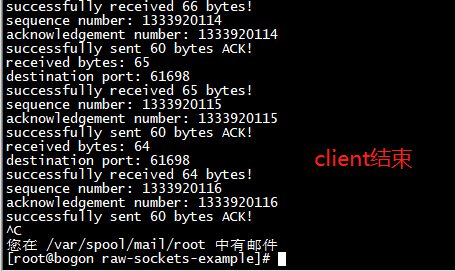

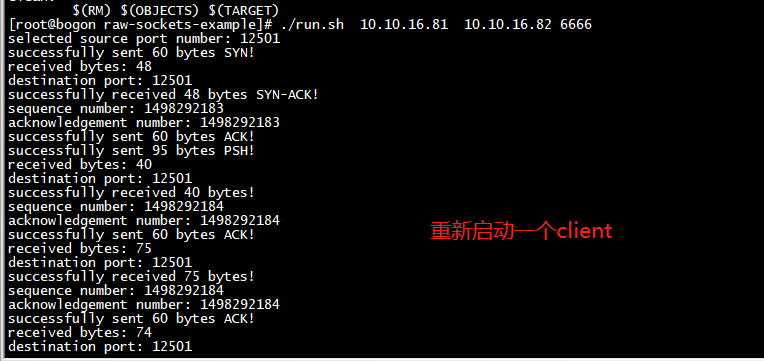
又多了个一个connect
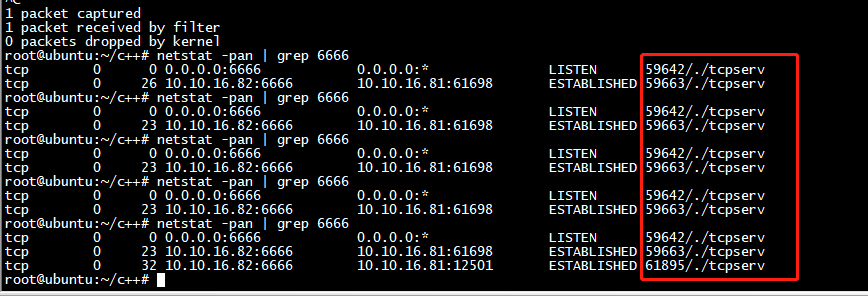
从server端发起connect

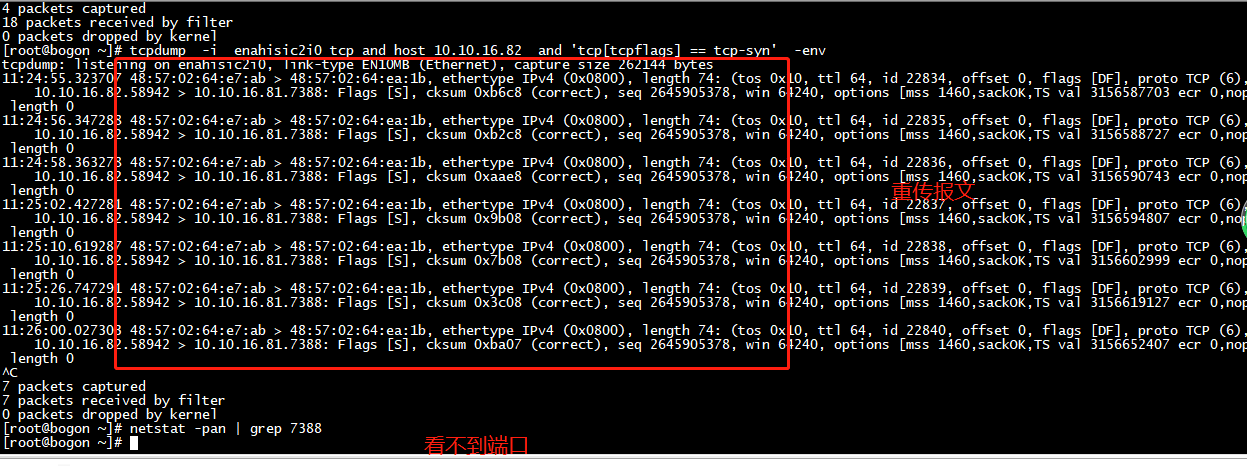
把服务端停止
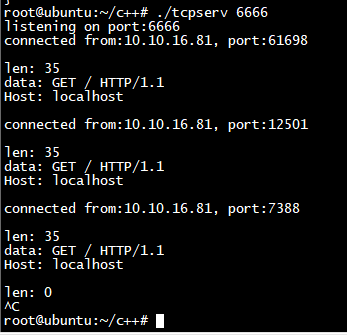
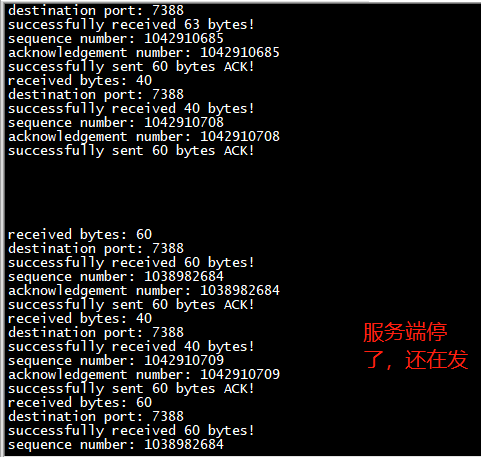
标签:pid_t srand eol gem eof represent pre clu 图片
原文地址:https://www.cnblogs.com/dream397/p/14773406.html